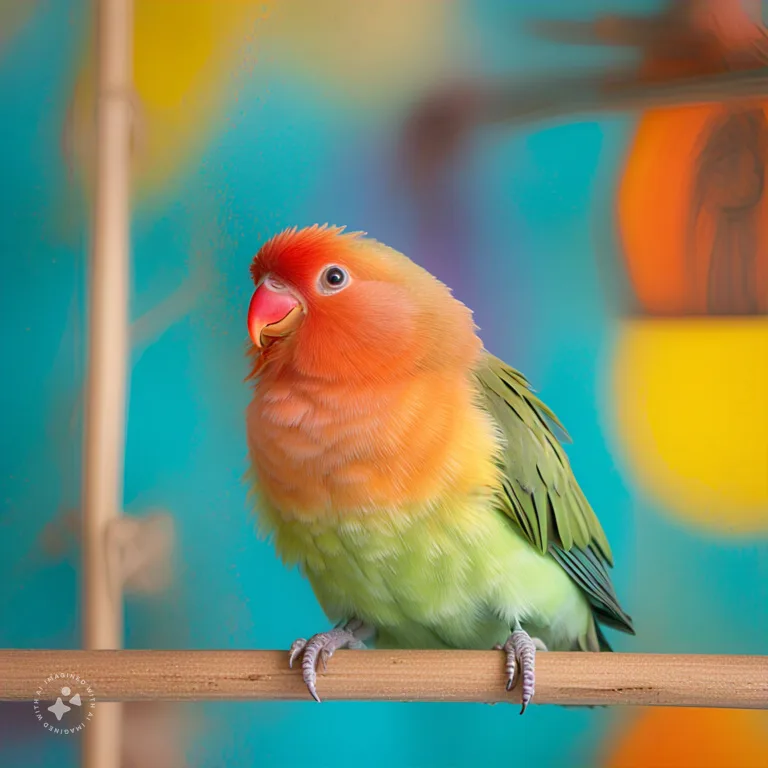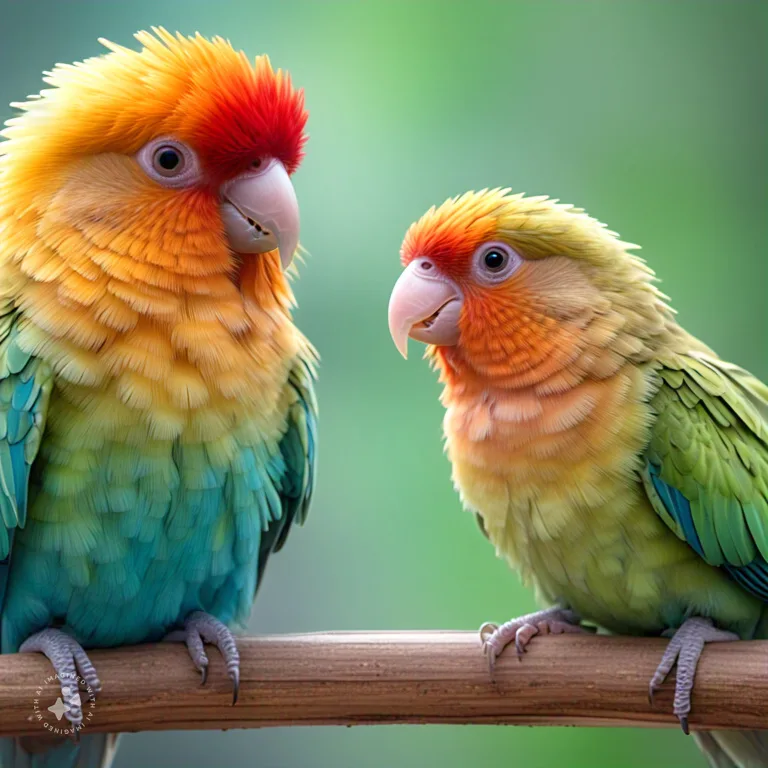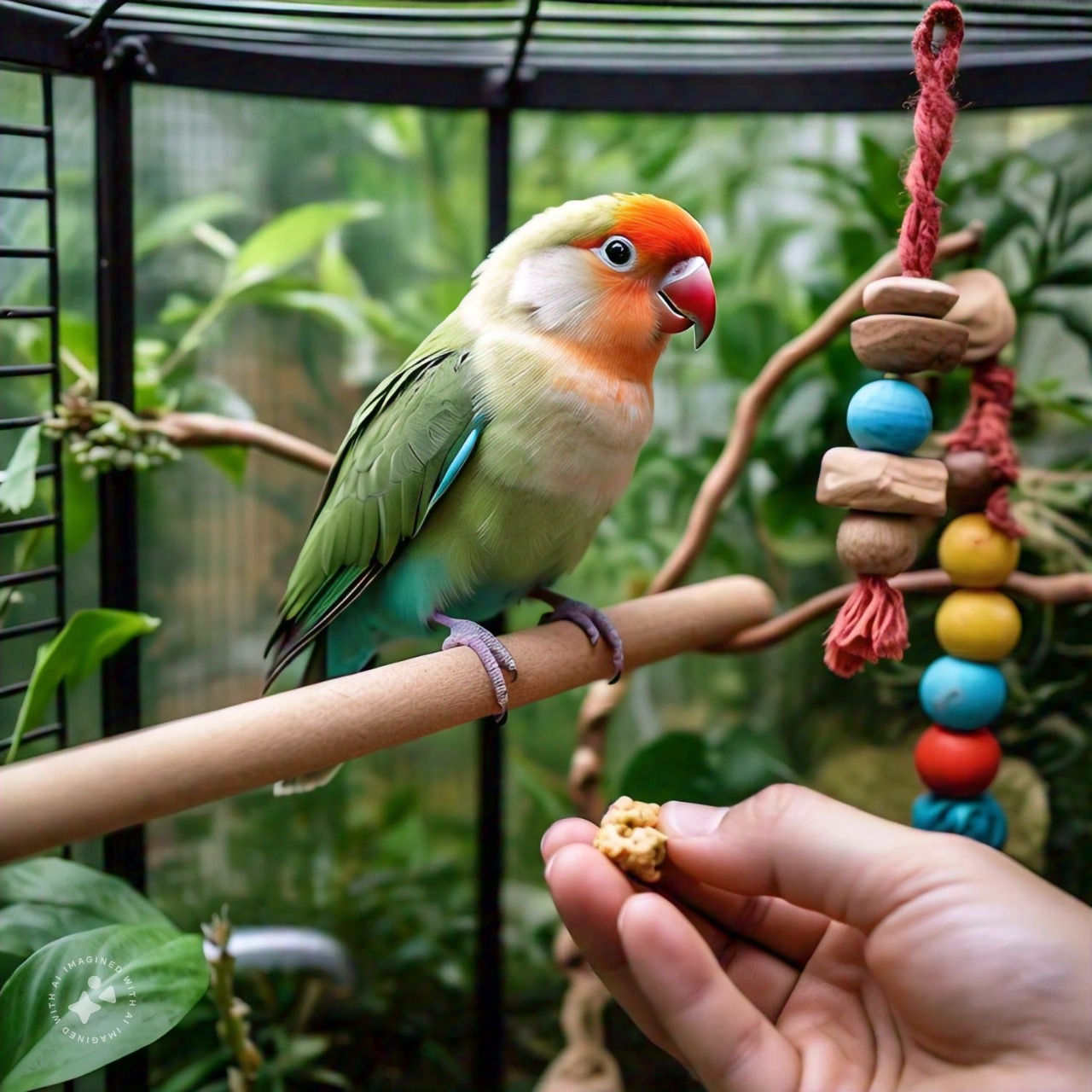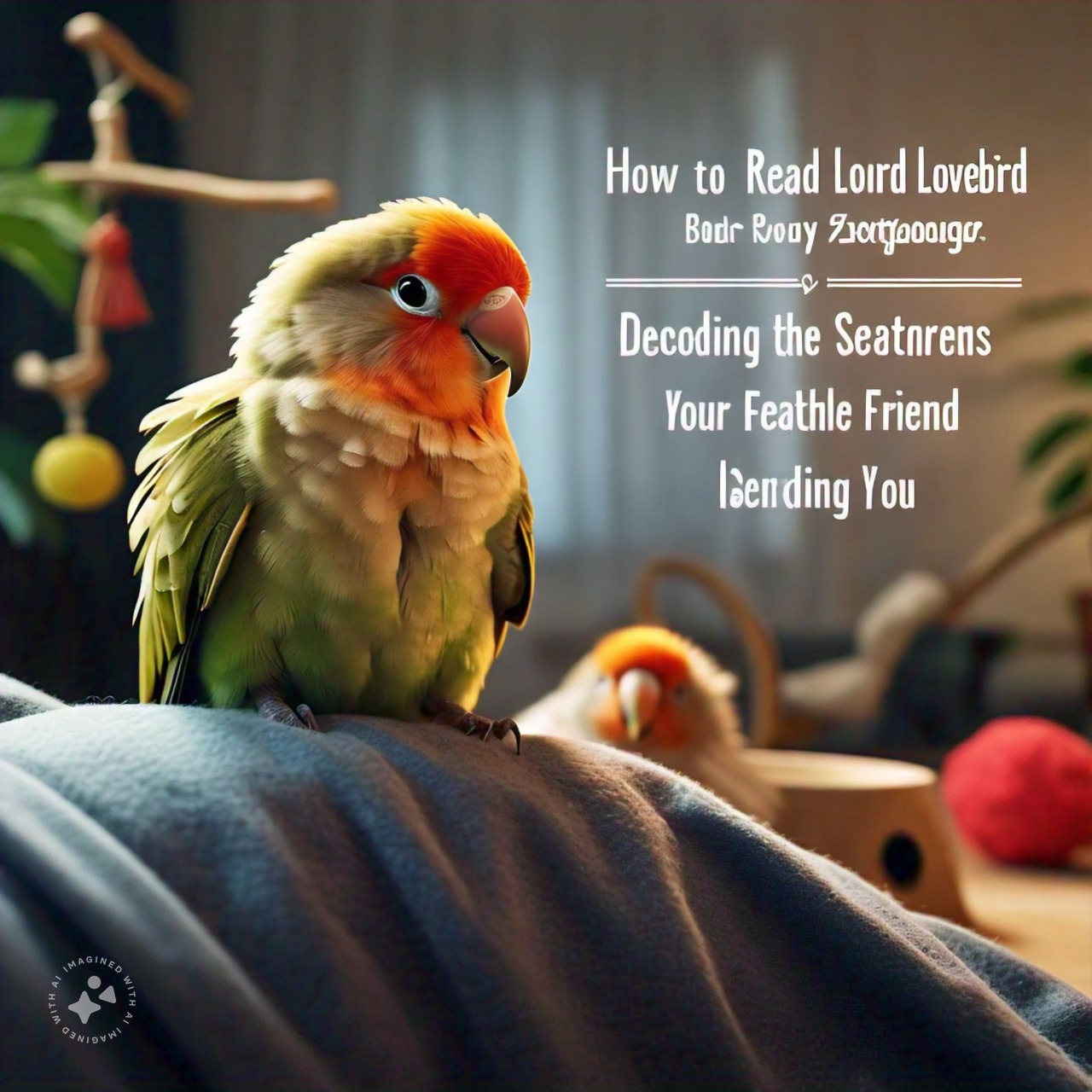5 Common Lovebird Behavioral Problems and How to Solve Them: From Screaming to Aggression
Introduction
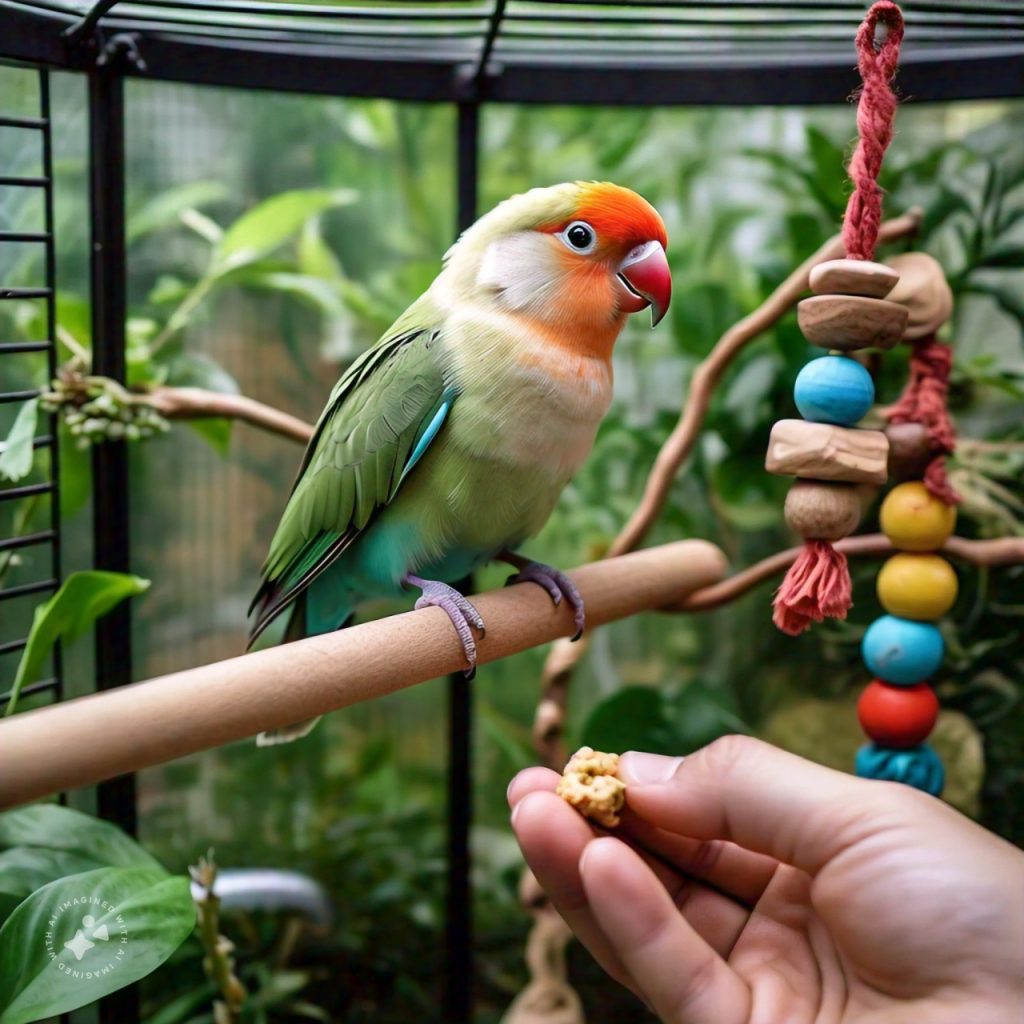
Lovebirds are small, colorful, and charismatic pets that bring joy to any home. Known for their social nature and affectionate tendencies, they can also have behavioral quirks that can leave even the most experienced pet owners scratching their heads. From ear-piercing screaming to aggressive biting, lovebirds can sometimes display behaviors that challenge our understanding of them. But don’t worry! With the right approach and a bit of patience, these behavioral issues can be addressed effectively.
In this guide, we’ll walk through the five most common lovebird behavioral problems and offer you solutions that will help restore peace and happiness to your bird’s life (and yours!). Whether you’re a seasoned bird owner or a first-time lovebird parent, these tips are designed to help you build a stronger bond with your feathered friend while solving lovebird behavior issues for good. For a more in-depth look at lovebird behavior, check out this Bird Behavior Guide from Lafeber Vet.
Understanding Lovebird Behavioral Problems: Why Your Feathered Friend Acts the Way They Do
Before diving into solving lovebird behavior problems, it’s important to understand the root causes of these issues. Like all pets, lovebirds communicate through their actions, and many of their behavioral quirks stem from natural instincts or unmet needs.
For more insights on lovebird behavior, see Pet Coach’s Guide on Bird Behavior.
The Role of Socialization
Lovebirds are highly social birds that require constant interaction with their owners or fellow birds. A lack of socialization or interaction can lead to boredom, loneliness, or frustration, resulting in destructive behaviors like biting or screaming. Understanding your lovebird’s social needs is crucial to identifying and solving lovebird behavior issues.
Changes in Environment
Changes in their environment, such as moving to a new home, adding a new pet, or altering their routine, can also stress your lovebird and cause a shift in behavior. Recognizing the environmental triggers can go a long way in interpreting lovebird behavior and making the necessary adjustments to restore peace.
Health-Related Issues
Physical discomfort or illness can also affect your lovebird’s behavior. If you notice a sudden change in your bird’s demeanor—such as a drop in activity levels, reluctance to fly, or avoidance of food—this could be an indication of a health issue. It’s important to rule out any medical conditions by visiting an avian vet when necessary.
Understanding the psychological and physical triggers of lovebird behavior is essential when solving lovebird behavior problems. Let’s now dive into some of the most common issues that lovebird owners face.
Solving Lovebird Behavior Issues: Effective Strategies for Addressing Biting and Aggression
Biting and aggression are common lovebird behavior problems that can be a challenge for owners. Lovebirds can sometimes become territorial or defensive, particularly if they feel threatened or neglected. Let’s look at why lovebirds bite and how to solve this behavior.
Learn more about positive reinforcement for pet birds to encourage good behavior.
Why Do Lovebirds Bite?
Biting is often a sign of fear, frustration, or territorial behavior. Lovebirds are naturally protective of their space, and they may bite when they feel their territory or themselves are under threat. This is especially true if they’re handling multiple environmental stressors or if their routine has been disrupted.
How to Solve Lovebird Biting Behavior
Avoid Punishment: Lovebirds don’t respond well to harsh punishment. Instead, focus on positive reinforcement by rewarding good behavior. Use treats and praise to reinforce calm and gentle actions.
Increase Social Interaction: If your bird is biting because of boredom or loneliness, spend more time interacting with them. Offer toys and challenges that stimulate their minds and provide mental enrichment.
Create a Safe Space: Lovebirds need to feel secure. Provide them with a comfortable, safe environment where they can retreat if they feel overwhelmed. This might include offering a designated quiet area or cage for relaxation.
Address Territorial Issues: If your lovebird is particularly aggressive toward other pets or people, consider providing them with their own personal space within your home. This may involve setting up a designated perch or area that they feel is “theirs.”
By understanding lovebird aggression towards humans and following these tips, you can create a peaceful and loving environment for your pet. If the aggression persists, consulting an avian behaviorist might be a helpful next step.
How to Stop Lovebird Screaming: Proven Techniques to Quiet the Noise and Restore Peace
Lovebirds are known for their cheerful chirping, but when they scream excessively, it can be a major problem for both the bird and the owner. Excessive screaming can lead to stress and frustration for everyone in the household.
For more detailed advice on handling bird vocalizations, visit The Spruce Pets Guide to Bird Screaming.
Why Do Lovebirds Scream?
Screaming is a form of communication for lovebirds. They may scream when they want attention, when they’re hungry, or if they’re feeling anxious or bored. While occasional squawks are normal, constant screaming can indicate an underlying issue.
How to Stop Lovebird Screaming
Provide Attention and Enrichment: Lovebirds crave attention and stimulation. Ensure they have toys, puzzles, and other forms of enrichment that can keep them occupied and mentally stimulated.
Establish a Routine: Lovebirds thrive on routine. Establishing a regular schedule for feeding, playtime, and rest can help reduce anxiety and curb excessive noise.
Ignore the Screaming: It may seem counterintuitive, but one of the most effective ways to stop lovebird screaming is to ignore it. Giving in to their vocalizations will only reinforce the behavior. Instead, only offer attention when your bird is quiet and calm.
Provide a Quiet Space: If your lovebird screams out of boredom or stress, create a calm and quiet area where they can retreat when they need some alone time.
By understanding the lovebird vocalizations meanings, you can start interpreting their vocal behavior and addressing the root causes of their screaming.
Lovebird Stress Symptoms and Solutions: Identifying the Root Causes of Anxiety and Fixing Them
Stress is a significant factor behind many common lovebird problems, from screaming to aggression. Understanding lovebird stress symptoms can help you pinpoint when your bird is feeling anxious or overwhelmed and allow you to take steps to help them feel better.
To explore signs of bird stress and their solutions, see Signs of Stress in Birds.
Signs of Stress in Lovebirds
Feather plucking or grooming problems
Increased aggression or biting behavior
Decreased appetite or refusal to eat
Excessive vocalizations or screaming
Restlessness or changes in activity levels
How to Calm an Anxious Lovebird
Increase Interaction: Spend more time with your bird to alleviate feelings of loneliness or anxiety. Talk to them in a calm voice and offer gentle hand training.
Provide a Routine: Establishing a predictable routine can help reduce anxiety. Ensure they have consistent feeding times, playtime, and sleep schedules.
Optimize Their Environment: Create a stress-free environment by minimizing loud noises, sudden movements, and any potential sources of danger.
Consider Companion Birds: Some lovebirds do better with a companion of the same species. If your bird is lonely, introducing a second lovebird could help alleviate anxiety.
By addressing the lovebird body language problems associated with stress and following these solutions, you can help your bird feel calm and secure.
Lovebird Grooming Problems and Fixes: Tackling Body Language Issues and Encouraging Healthy Habits
Grooming is an important part of a lovebird’s daily routine, and it’s crucial for maintaining their health and happiness. However, lovebird grooming problems, such as over-preening or neglecting to groom, can be signs of underlying issues.
Why Do Lovebirds Have Grooming Problems?
Stress and Anxiety: Just like humans, lovebirds can neglect grooming when they’re stressed. Excessive preening can also indicate nervousness or boredom.
Health Issues: In some cases, a lack of grooming may be linked to physical health problems, such as skin infections or mites.
Environmental Triggers: Poor cage hygiene or dirty living conditions can also affect a lovebird’s grooming habits.
How to Fix Lovebird Grooming Problems
Provide a Clean Environment: Ensure your lovebird’s cage is kept clean and their living space is free of any contaminants that could cause irritation or illness.
Reduce Stress: As we discussed earlier, stress plays a significant role in grooming problems. Implementing relaxation strategies and improving their overall living conditions can help your bird focus on healthy grooming behaviors.
Offer Bathing Opportunities: Some lovebirds enjoy taking a bath, and this can help with grooming. Offer a shallow dish of water or use a misting bottle to allow your bird to bathe.
Check for Health Issues: If your lovebird is neglecting grooming or over-preening, it’s a good idea to visit an avian vet to rule out any health issues that may be affecting their grooming behavior.
Conclusion
Lovebirds are wonderful companions, but like any pet, they come with their own set of behavioral challenges. By understanding the root causes of common lovebird behavioral problems—whether it’s aggression, screaming, stress, or grooming issues—you can better support your feathered friend and create a positive environment for them to thrive.
For additional resources on bird care and behavior, you can also explore BirdChannel’s Behavior Guide.
Remember, solving lovebird behavior problems takes time, patience, and consistent effort. Whether you’re working on lovebird biting behavior, calming an anxious lovebird, or fixing lovebird not eating solutions, the key to success is understanding your bird’s needs and responding to them with care and attention.
With these solutions in hand, you can foster a deeper bond with your lovebird and help them live a happier, healthier life.


